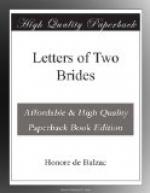Macumer treated this officious scandal-monger to one of those glances of his which seem to me so eloquent of noble scorn, and replied to the effect that he was “not in love with any little coquette.” His whole bearing so delighted me, that directly I caught sight of my father, the glove was off.
Felipe had not a shadow of fear or doubt. How well did he bear out my expectations! His faith is only in me, society cannot hurt him with its lies. Not a muscle of the Arab’s face stirred, not a drop of the blue blood flushed his olive cheek.
The two young counts went out, and I said, laughing, to Macumer:
“M. de Marsay has been treating you to an epigram on me.”
“He did more,” he replied. “It was an epithalamium.”
“You speak Greek to me,” I said, rewarding him with a smile and a certain look which always embarrasses him.
My father meantime was talking to Mme. de Maufrigneuse.
“I should think so!” he exclaimed. “The gossip which gets about is scandalous. No sooner has a girl come out than everyone is keen to marry her, and the ridiculous stories that are invented! I shall never force Armande to marry against her will. I am going to take a turn in the promenade, otherwise people will be saying that I allowed the rumor to spread in order to suggest the marriage to the ambassador; and Caesar’s daughter ought to be above suspicion, even more than his wife—if that were possible.”
The Duchesse de Maufrigneuse and Mme. d’Espard shot glances first at my mother, then at the Baron, brimming over with sly intelligence and repressed curiosity. With their serpent’s cunning they had at last got an inkling of something going on. Of all mysteries in life, love is the least mysterious! It exhales from women, I believe, like a perfume, and she who can conceal it is a very monster! Our eyes prattle even more than our tongues.
Having enjoyed the delightful sensation of finding Felipe rise to the occasion, as I had wished, it was only in nature I should hunger for more. So I made the signal agreed on for telling him that he might come to my window by the dangerous road you know of. A few hours later I found him, upright as a statue, glued to the wall, his hand resting on the balcony of my window, studying the reflections of the light in my room.
“My dear Felipe,” I said, “You have acquitted yourself well to-night; you behaved exactly as I should have done had I been told that you were on the point of marrying.”
“I thought,” he replied, “that you would hardly have told others before me.”
“And what right have you to this privilege?”
“The right of one who is your devoted slave.”
“In very truth?”
“I am, and shall ever remain so.”
“But suppose this marriage was inevitable; suppose that I had agreed . . .”
Two flashing glances lit up the moonlight—one directed to me, the other to the precipice which the wall made for us. He seemed to calculate whether a fall together would mean death; but the thought merely passed like lightning over his face and sparkled in his eyes. A power, stronger than passion, checked the impulse.




